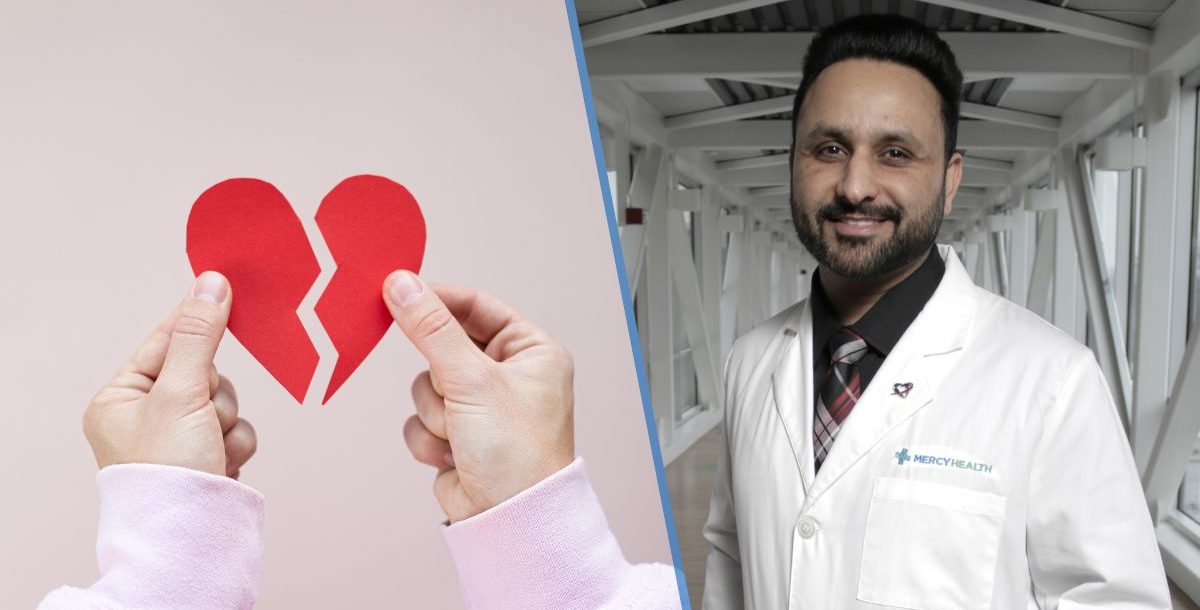You might be wondering, can you die from broken heart syndrome? Luckily, broken heart syndrome is often a reversible condition with an excellent prognosis.
However, before we dive into treating broken heart syndrome, lets first take a look at what broken heart syndrome actually is.
What is broken heart syndrome?
Most people think of a “broken heart” as an expression used when suffering a physically or emotionally stressful event. However, did you know that emotional heartbreak can cause cardiac complications? Yes, the results of breaking up with a significant other or losing a loved one can cause cardiovascular issues through an illness known as broken heart syndrome.
Broken heart syndrome, also known as stress-induced cardiomyopathy or Takotsubo cardiomyopathy, is a temporary heart condition that is caused by severe emotional or physical stress like a serious physical illness, surgery or death of a loved one. Although both men and women can develop broken heart syndrome, women are more likely to experience it.
“This is a condition, in which the heart muscles get temporarily stunned, enlarge and become weak, causes an inability to pump the blood,” Hemindermeet Singh, MD, a cardiologist in our Toledo market, shares. “This is brought on by sudden intense emotional or physical distress. Although the exact mechanism isn’t fully understood yet, a sudden surge of stress hormones, especially adrenaline, is believed to cause spasm in the heart arteries leading to weakening of part of the muscle.”
Broken heart syndrome’s most frequent symptom is sudden, intense chest pain, which may mimic a heart attack. Other symptoms of broken heart may include shortness of breath, palpitations and weakness. People with broken heart syndrome can experience a temporary disruption of the heart’s normal pumping function. However, the remainder of the heart functions normally or with more forceful contractions.
“Doctors can diagnose broken heart syndrome properly once determining that there are no blockages in the heart arteries,” Dr. Singh adds.
Then, once confirmed, the condition is treated with medication to strengthen the heart muscle.
How can I avoid developing broken heart syndrome?
Again, the good news is that broken heart syndrome is often a reversible condition with an excellent prognosis. Majority of patients fully recover within two to four weeks with medical therapy.
Taking self-care time can help relieve your stress after a traumatic event. Although it is impossible to avoid all stress in life, Dr. Singh advises developing good coping habits, like regular exercise, meditation, establishing a good family and friends circle, eating healthy and practice good sleep habits to keep your heart healthy.
“Small heart-healthy actions like adding more activity and eating smart can make big difference in keeping our hearts strong,” Dr. Singh says.
What are symptoms of a heart attack?
Since the symptoms of broken heart syndrome and a heart attack are similar, let’s go over the symptoms of a heart attack as well.
If you think you may be having a heart attack, call 911 and visit an emergency department right away.
Symptoms include:
- Chest pain
- Squeezing, uncomfortable pressure or pain in the center of your chest
- Pain in one or both of your arms, stomach, jaw, neck or back
- Shortness of breath
- Nausea, vomiting, lightheadedness or breaking out in a cold sweat
So, can you die from broken heart syndrome? Not usually, but, again, heart attack symptoms are very similar to broken heart syndrome. So, if you are experiencing any of these symptoms, it is important to seek care right away.
Learn about the heart and vascular services we provide at Mercy Health.






